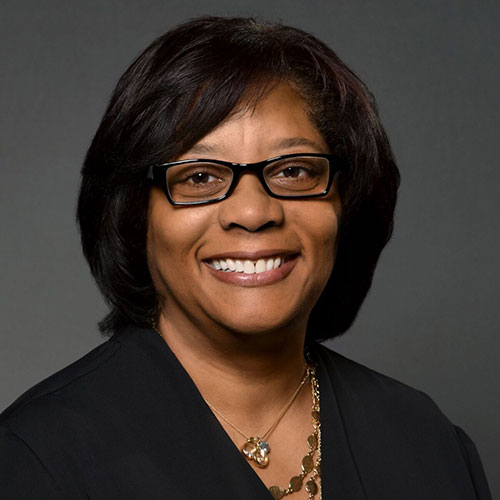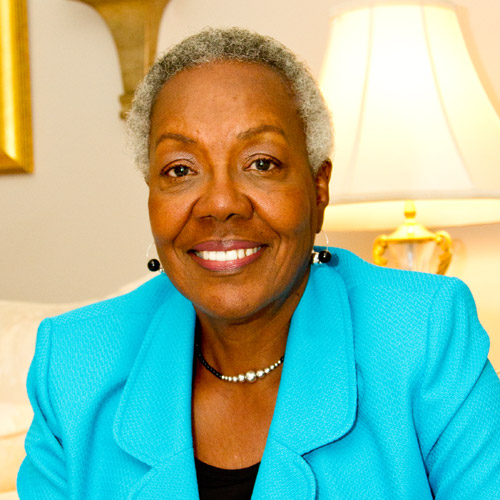
Paula A. Sneed and Courtney Bass
Biography
Paula A. Sneed spent nearly 30 years at General Foods and Kraft Foods in a variety of marketing, general management, and senior executive roles. For a number of years prior to retirement she was a member of the Kraft executive team, a 12-member group of the company's most senior leaders. As chief marketing officer, executive vice president, and president of two operating divisions, as well as executive vice president of the eCommerce division and executive vice president of Global Marketing Resources and Initiatives, Paula led teams that grew the company's iconic brands.
As an advocate for diversity, equity, and inclusion in the workplace, Courtney Bass has spent her career developing and implementing strategies that both individuals and teams can leverage for meaningful collaboration and growth. She is currently an HR business partner at Google, where she coaches and advises leaders on how to manage and motivate their teams.
What impact did HBS have on your life and the life of others?
Paula: I entered HBS in the fall of 1975 with a degree in social science, six years in nonprofit management in Boston's Black community, and no formal business experience. Several factors prepared me for that moment. The first was my parents, who were raised in the 1920s and '30s under Jim Crow yet somehow remained optimistic about the future. In 1939, when my Mom graduated from high school with a commercial degree in typing, shorthand, and bookkeeping, she could not get a job because no one would hire Black women to work in Boston offices. After World War II, that changed; she and my Dad were active in the civil rights movement as I was growing up in the 1950s and '60s. They gave me confidence by passing down stories about slaves who had resisted and Black leaders who for generations had challenged the realities of injustice. They also stressed that I should educate and prepare myself for what I wanted, not what was available—the logic being that if an opportunity showed up and I was ready, I might have a shot. At a time when society questioned the intellectual capability of African Americans, they stressed that I could compete academically with anyone, and that no matter how society perceived me, only I could write my story.
I was also prepared for HBS because I understood the power and potential of Black women who had a purpose and intent—women like Harriet Tubman, Sojourner Truth, Madam C.J. Walker, Mary McLeod Bethune, Fannie Lou Hamer, Ida B. Wells, Shirley Chisholm, Rosa Parks, Angela Davis, and Nina Simone, to name a few. Their accomplishments and choices were my North Star. But countless other Black women I knew who will never be famous were also part of that constellation—women who worked, raised families, and were leaders in their church, all while moving the Black community forward. They took bold steps into dark rooms of bigotry and racism and turned the lights on so young Black women like me could see a path to our dreams.
Courtney: My Mom told me about HBS and what it had meant to her from the time I was a child. One of the most formative things she told me was how much she had learned there, and how important the experience had been for her career. I feel the same way—what I learned at HBS I use every single day in my current role at Google. And I have lifelong friends from that experience. But it wasn't an easy experience. When I was at HBS, it didn't feel like there was space to articulate some of the perspectives that are more prevalent now with the #MeToo movement and Black Lives Matter movement. If I made the point in class that we were critiquing a female protagonist's style in a way that wasn't true of a male protagonist, the eyes would start rolling. But I have strong beliefs I hold to very firmly, and feeling that resistance encouraged me to hold to them even more strongly. I do believe my experience would be completely different today, because it's become possible to talk about these issues more freely now.
Paula: I'm proud of Courtney and her courage to speak up for change—which is what my parents encouraged in me. Despite how comfortable I felt coming into HBS, in my first week a classmate walked up to me and said, "You took the seat of a qualified white male." Stunned by his directness, I boldly responded, "I will do better than him with that opportunity." That exchange was further fuel to my already kindled determination to maximize what I took from the two-year experience. (By the way, I reminded that sectionmate of his comment at our 30th reunion.) Another incident I recall was being invited to the admissions office and told that the people who were most likely to fail academically (we called it "hitting the screen") in the first year were women, people of color, and foreigners, and that I should work extra hard as a result. I remember saying to the admissions officer, "Listen, this place has enough pressure as it is. If you didn't think we could do this work, why did you admit us? And, trust me, I will not be hitting the screen." Today, I believe that Dean Nitin Nohria has truly changed the culture by listening to alumni, faculty, students, and staff as a way of acknowledging the School's past and setting a new tone for the future. As Courtney said, I believe there is now a higher level of respect within the classroom for what individuals bring to the table, and a lot less judgment about a person's potential contribution based on where they come from in the world and what they look like.
Courtney: We've come so far in some ways—my mom is really into genealogy, and has traced our family back to men and women born into slavery in the early 1800s. And today I work at Google, which is one of the best companies in the world. I realize that a great deal of privilege has been bestowed upon me to get where I am, but I still feel like there are not enough of us—we're not at the tables where we need to be, and it makes me sad. We've made progress at the macro level, but it doesn't really feel like it on the micro level.
Paula: If you look at the number of African Americans and Latinos who've graduated from major business schools since I left HBS over 40 years ago, the fall-off in terms of the number of people who have made it to the C-suite is much more pronounced than it is for white men. The reason being, you can go to these elite institutions, but when you come out, there aren't always supports in place to help with managing your career and your life. I was fortunate enough to understand—and I think it comes from being part of the Civil Rights era—that I needed a collection of people with insight and wisdom into what I needed to know that I couldn't intuitively figure out on my own. My husband of almost 40 years has been a major advisor, but so have countless others who invested in me. While some were traditional mentors and advisors, others were not. They were administrators or long-service junior people who understood corporate realities and were kind enough to help me see around corners that I didn't even know were there. All of that led not only to senior executive roles at Kraft but to the corporate board roles that I now have.
Today, my husband and I both try to provide that counsel and help to others, because you cannot be successful in this world unless you have some sort of guide who can come back and say, "Here's what the road ahead looks like." I took a course my second year at HBS, Self-Assessment and Career Development, that really forces people to unpack who they are and develop data points around that information. It changed my life. And I use that approach in the coaching work I do now. My advice to current and future HBS students would be to push yourself to take advantage of the academic environment. Some people say the best part of business school is the networking. It isn't. The best part is learning from and with the world-class faculty and the breadth of students from around the world.
Courtney: I got into a little bit of a herd mentality at HBS and went into consulting after business school. If I were to give anyone advice, it would be to really take that time to figure out what you want to do. I didn't have the courage to initially follow my professional dreams, and many of my classmates also weren't able to do so. Ultimately, it turned out okay, because now we're all in places where we want to be—it just took more time.
Paula: What attracted me to consumer packaged goods was that in addition to knowing the physical product, you used aspects of sociology and psychology to understand the consumer. Brand managers led a team of people and essentially ran a business, which suggested I could learn a tremendous amount about business on someone else's dime. There had never been a Black woman promoted to brand manager at General Foods (a successor to Kraft Heinz). So my attitude was, "Okay, let me see if I can make it to that level and beyond." I loved the work, but I also loved knowing there was a ceiling up there that I could keep pushing higher and higher. When I was first promoted to vice president, Courtney was just 4 or 5 years old. I was braiding her hair one day and said, "Mommy got a promotion." She said, "You got a promotion before." I told her, "No, this is a really good promotion. Mommy is a Vice President." She turned around and looked at me and said, "Mommy, when I grow up, I'm going to be a President." I just laughed and said, "You're right, Courtney. You will be a President." She clearly knew which was better.
Courtney: When I think about what I've been able to achieve and the success I've had, it has been magnified by the success of my mother and father. My mom always reminded me of the effect of her own mother and father's success and perseverance. There's an exponentially positive impact to your life when the people who came before you have walked a similar path. The power of an HBS degree is incredibly high, but where you see it become totally transformational is when you are able to compound it over generations. If I someday have children, I won't push them hard to go to HBS, but I will hope they find the desire to attend the school themselves.
Paula: There is something we must do as African American parents, godparents, aunts, and friends of younger people—and that is to not tell our youth what to do, but to describe the benefits and downsides of the choices they can make. As a people, we have accountability and a responsibility to address the structural racism and other issues that are still holding back too many of us.

